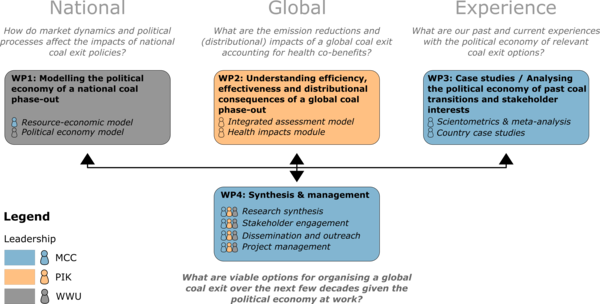Organizational Structure and Work Packages

Work Package 1: Modelling the political economy of a national coal phase-out (Lead: WWU, contributing: MCC)
This WP aims to understand the political economy of a national coal phase-out and to characterise potential political frictions and hurdles that impede such a phase-out. In particular, we are interested in answering the following overarching research question: How do market dynamics and political processes affect the options and impacts of national coal exit policies? We will construct a detailed database of coal mines that considers political economy factors. Importantly, we will also develop a political economy model and a resource economic model. The resource economic model will help to (i) understand the role of coal exit policies on committed carbon and (ii) estimate the direct job losses from coal exit policies. The political economy model conceptualises frictions caused by strategic behaviour of institutional actors (for example the bargaining within a federal systems) which might lead to non-efficient commitment to the usage of this technology and an overly costly coal phase-out.
Work Package 2: Understanding efficiency, effectiveness and distributional consequences of a global coal phase-out (Lead: PIK)
In this WP we will use a global and regionally detailed energy-economic-climate model (REMIND) to quantify the efficiency, effectiveness and distributional consequences of implementing various coal phase-out policies. The health impact module in REMIND will further allow us to estimate the co-benefits of these policies from reduced air pollution. To that end, REMIND will be first improved to reflect the current state of coal supply and demand across the world. Coal phase-out policies will then be designed and introduced in the model. Finally results will be analysed.
Work Package 3: Case studies / Analysing the political economy of past coal transitions and stakeholder interests (Lead: MCC)
This work package will focus on mapping and aggregating existing coal phase-out experiences as well as importing crucial knowledge from key stakeholders outside the public domain. The analysis will be undertaken in four case study countries (Germany, Australia, India, Indonesia) that we consider archetypical, representing potentially different political and economic debates in developed and developing and (majorly) consuming and (majorly) exporting countries. In this work package an analytical framework will be developed and used with a view to gain a detailed understanding of the political economy of coal exits. This framework will guide both meta-analytical research on coal exit discussions from publicly available, documented knowledge domains as well as case study research targeting undocumented knowledge from key actors involved in coal exit discussions. This work package will provide the analytical framework for political economy consideration in the entire project. It further informs scenario analysis in WP1 and WP2 and will be a key ingredient for the project synthesis in WP4.
Work Package 4: Synthesis and management (Lead: MCC, contributors: PIK, WWU)
Synthesis is at the core of this project. Outcomes of the work packages have been designed in a way that they can be jointly analyzed. This is facilitated by common scenario design features in WP1 and WP2, the overarching conceptual framework in WP3 as well as the specific selection of the case study countries in WP3 that allows treating them as archetypes for broader groups of countries. The unique contribution of this project as a whole is to combine different knowledge domains and hence provide a more holistic map of knowledge regarding the efficiency, effectiveness and distributional impacts of alternative policy packages towards global and national coal-phase outs. In the synthesis part in particular, we will explore the use of formal evidence synthesis methods such as realist reviews to analyze the various strands of qualitative and quantitative evidence together. Establishing formal methodological bridges that link climate change mitigation scenarios and insights from political economy studies is fundamental to advancing our understanding of viable policy pathways to global and national coal exits - and ultimately for appreciating key avenues for meeting the international climate goals of the Paris Agreement.





